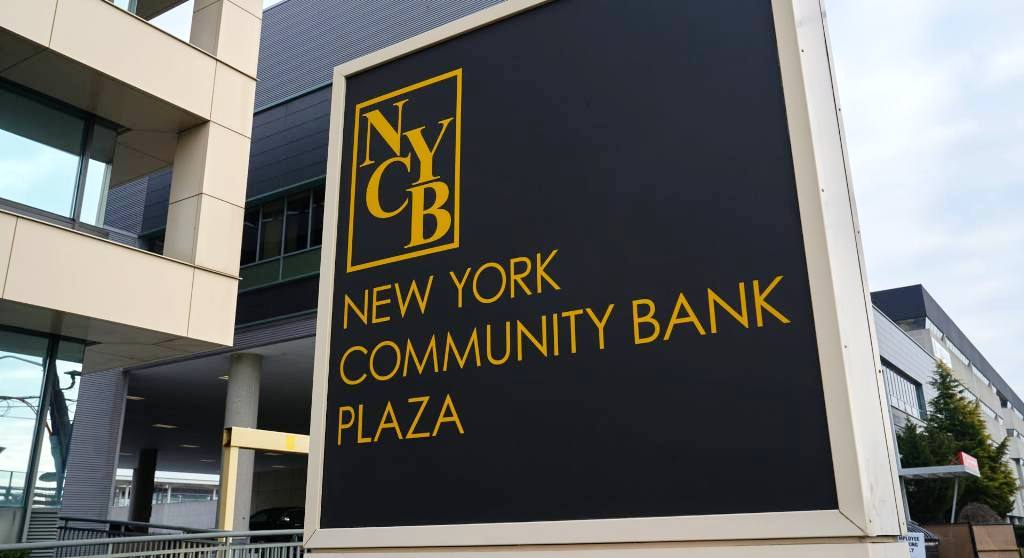On Wednesday, the Federal Reserve changed its tone on the health of the US banking system. For the first time since three banks collapsed last spring, the Fed did not say that the banks were “sound and resilient” in its meeting statement.
That same day, many people were questioning the stability of the banks as they watched the shares of New York Community Bancorp (NYCB) drop sharply. The regional bank’s stock closed down 38% on Wednesday and fell another 11% on Thursday.
The reason for the sell-off was a shocking loss of $252 million in the last quarter of 2023, compared to a profit of $172 million in the previous quarter. The bank also reported a huge jump in loan losses, from $62 million to $552 million.
The bank’s troubles were mainly due to bad loans on office buildings, which have suffered from low occupancy and high defaults amid the pandemic.
The news of NYCB’s woes spread quickly on Wall Street, sparking fears of a contagion effect on other banks.
The banking sector has been under stress since last year
The KBW Regional Banking Index, which tracks the performance of regional banks, dropped 6% on Wednesday. It recovered slightly on Thursday, closing down 2%.
Some individual bank stocks also took a hit. Over the two days, Western Alliance Bancorp (WAL) and Zions Bancorporation (ZION) lost 13% and 12%, respectively.
The banking sector has been under stress since last year when several banks failed or needed bailouts due to the economic fallout of the pandemic. Investors and depositors are still wary of any signs of weakness in the industry.
However, some analysts think the current situation is not as dire as it seems.
The KBW Regional Banking Index, which tracks the performance of regional banks, dropped 6% on Wednesday. It recovered slightly on Thursday, closing down 2%.
Some individual bank stocks also took a hit. Over the two days, Western Alliance Bancorp (WAL) and Zions Bancorporation (ZION) lost 13% and 12%, respectively.
The banking sector has been under stress since last year, when several banks failed or needed bailouts due to the economic fallout of the pandemic. Investors and depositors are still wary of any signs of weakness in the industry.
NYCB not on the verge of failure, analyst says
NYCB was one of the few regional banks that did well during last year’s crisis. It kept most of its deposits and used its cash to buy about $40 billion in assets, including $13 billion in loans, from Signature Bank, which had failed.
The deal increased NYCB’s total assets to over $100 billion. This meant that the bank had to follow stricter rules and keep more capital as a cushion against potential losses. This also limited the amount of money the bank could lend out.
NYCB’s CEO Thomas Cangemi said on the earnings call on Wednesday that the bank was adjusting to the new regulations and taking a conservative approach to its loan portfolio.
Chris Marinac, research director at Janney Montgomery Scott, told CNN that he did not think NYCB was in danger of failing.
“Investors are scared because they believed NYCB was cleared because they acquired a bank that went bankrupt,” he added. “As a big bank with assets over $100 billion, NYCB is adjusting to higher standards and attempting to be early rather than delayed or sluggish play.
NYCB did not respond to requests for comment on its stock performance and outlook.
US office loans also hit Japan’s Aozora Bank
NYCB’s losses were not the only ones linked to US office loans. Japan’s Aozora Bank, which has significant exposure to US commercial real estate, said on Thursday that it expected to lose 28 billion yen ($190 million) last year. The bank blamed its bad loans on US offices, which have suffered from low occupancy and high defaults amid the pandemic.
The bank’s stock closed 26% lower on Thursday.
It may take a while for NYCB to recover from its losses this week. But will other bank stocks continue to suffer?
Marinac is not too worried.
He noted that “banks trading poorly for a while, then rational and composed investors came again in as stock prices stabilized” following the failure of First Republic two months after Silicon Valley Bank and Signature in May of last year.
He stated that he anticipated the same outcome this time. Even at Thursday’s price, he added, NYCB remained a great investment, and he continued to suggest the stock.

Leave a Reply